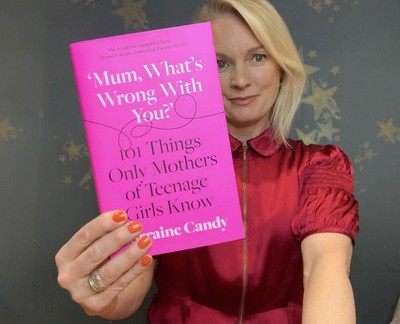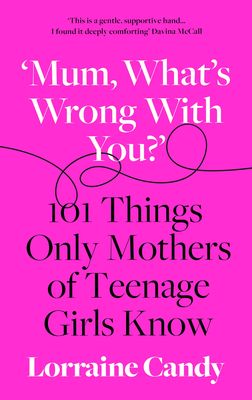
How To Raise Happy & Confident Teenage Girls
All products on this page have been selected by our editorial team, however we may make commission on some products.
Lorraine, let’s start with a big question – why are the teenage years so challenging?
The reason I wrote the book was to reach ordinary mums raising ordinary teens, tweens and pre-teens. So, it’s not aimed at anyone dealing with extreme issues like eating disorders or anxiety; it’s for normal mums raising teenage daughters who experience this sudden, overnight change – which feels like a brutal rejection. Chaos starts to enter the house, and they may become incredibly demanding – much more so than toddlers – and they only want you. Every problem seems to need solving by mum. From my own experience, I was very shocked that no one was talking about this shift and why it happens. Via writing my parenting columns for two national newspapers, I’d been privileged enough to talk to leading experts around teenage development. What occurred to me was how solvable a lot of these problems are – it’s why I decided to put everything in one book. It’s partly based on things that have happened to me which is why I focused on girls, and partly what the experts recommend.
And what makes the mother-daughter relationship especially tricky?
My personal experience of raising two teenage girls as a female offered some seriously eye-opening moments that all women, all mothers, need to be talking about more. As a woman, the moment you hit 40 and the perimenopausal years, your hormones start to fluctuate wildly – just when your teenager’s hormones also start changing massively. There’s something like 40 different symptoms of the perimenopause, one of which is extreme rage, another is insomnia and another is sheer exhaustion – which is caused by vital hormones gradually disappearing from your body. It means that just as your children become adolescents, you also hit a difficult transition. In my opinion, not talking more about this parallel does women over 40 a massive disservice. Opening up the conversation impresses upon them the importance of taking care of themselves, too.
What else makes the female-on-female relationship so unique?
Any expert will tell you the single most important female role model for your daughter is their mother or significant adult female carer. She is acutely watching you and she has been since she was very small. Her identity, which is what ultimately develops during the teenage years, will be hugely informed by the kind of role model you are. As her brain changes (it quite literally gets taken apart and put back together again in a neurological sense) they’ll reject parts of you and accept others. Because you’re also a female, there’s also this very primal instinct where they may hand you all their bad, sad and difficult problems, because they know you most likely have the emotional intelligence or experience to deal with them. It was the rejection part I found most brutal. They need to separate from you to find out who they are, and they’ll tell you there are plenty of things they don’t like about you. Boys don’t want to be you, so it’s very different and far less complicated.
Is it ever a good idea to try to be ‘friends’ with your teen?
Out of the many experts on adolescent mental health I interviewed for the book one, American psychologist Lisa Damour, who works exclusively with teenage girls, told me it makes her shudder to hear mums say their daughter is their best friend. Ultimately, all mothers want their daughters to like them, but teenagers should be able to lead a separate life from their mothers. This helps them become resilient human beings. So it’s okay for them to have secrets – some things should be kept private. And every child should know what it is to be happy as well as to be sad, so they can learn to deal with their own feelings. As a generation, we seem to have tried to make our children happy all the time, as if that is a normal default setting – but this isn’t realistic. Teens need to experience lots of feelings – you can't possibly ensure their happiness all the time. So when a mum is trying to please their daughter all the time, it may be the teenage girl feels incredible pressure to make their parent happy. That can be quite stressful for them emotionally and make it harder for her to have her own happiness. It’s much more important to allow them to bond with their peers than their parents; they won't feel stressed about keeping their peers happy.
Body image is a huge issue for teenage girls – what are your thoughts?
The rise of social media has certainly made this a far bigger and more challenging topic. It’s also made it an equally important problem for both teenage girls and teenage boys. That said, I think it’s still harder for girls. In an ideal world, parents would say nothing from birth about their children’s appearance. There should be no emotional value placed on that or school or academic performance either, but on who they are as a person. In western society, that’s really, really hard to do. Body image is so much bigger than all of us – if you think about it, you shouldn’t comment on anyone else’s appearance either, but how many of us can say we do that? It also crops up in films, books, magazines – this is a debate that’s been raging for years. It’s a problem that exists, so as parents it’s our job to build up teens’ confidence in other areas of their life so they don’t feel as much pressure on this one issue.
Are some teenagers more susceptible to these kinds of issues than others?
As your teen’s neurology changes during these five or so years, some children may turn out to be more sensitive than others. It’s something we can often spot ahead of time – for example, my two teenage daughters are only a year apart, they have the same parents and yet they have a completely different reaction to and relationship with social media. The experts recommend starting early on building resilience when it come to any any negative feelings provoked by using social media: give them confidence in other areas. Don’t bother saying “Don’t look at social media.” It won’t work – we can’t get rid of it or indeed remove all the bad things from our children’s lives. They may be affected by certain things but it’s about how they deal with it and how we can help them navigate it. And remember, the world has made a lot of strides in terms of women’s rights and representation – watch any film from the 80s and you’ll see how far we’ve come.
As someone who worked in women’s magazines, how do you think teenage girls should interact with the worlds of fashion and beauty?
It’s perfectly okay to have fun with fashion and beauty – it can be helpful when it comes to building confidence, actually. It’s more about the language you use, especially when it comes to the way you talk about your own body. For example, women’s body shapes change dramatically after 40, and if you’re constantly saying how much you hate your muffin top, then it’s a very hard message for your daughter to hear. It’s very hard, but you have to be mindful of what you’re saying when you’re around your teen – it’s fine to explore it as an issue together but try not to make it a central part of every discussion.

Speaking of – the ‘sex talk’ is another big issue for parents and teens to navigate. Any tips?
Today, there’s so much information out there, so teenagers probably know a lot about this subject already but they often don't know what to do with all that information, which is where you come in. My advice is start early, at four or five, talking about relationships, and how we navigate them, using language appropriate for that age. The Dutch teach their children very early about bodies, pleasure and what sex means in a relationship or out of one. Interestingly, research also tells us teenagers do want to receive most of this information from their parents – specifically their mum. Also, the conversation should also be based less on the physicality of this issue and more on the emotions to begin with. There’s a whole list of resources in the book of various places you can go to learn the correct language to be able to talk to today’s teenagers about sex and gender, including LGBTQ+ issues. Also, Sex Education on Netflix – I can’t recommend it enough as a starting point. It’s started lots of interesting conversations in our house. Schools aren’t as proactive on this issue because they’re scared of what some parents might say, and their approach tends to be quite old-fashioned. Remember, your teenagers will be so pleased to see you can have a non-judgemental, non-panicky, non-catastrophising conversation about relationships and sexuality. Finally, bear in mind that some teens will see this as a hugely private topic, so try to be as open and as educated as you can.
Porn is a big part of this conversation – what’s your perspective?
Again, conversation is key. The headlines can be terrifying, implying that all teenage boys are addicted to graphic porn. Some might be, a lot aren’t. A lot of parents panic and expect the worst. But that’s frightening for teenagers to see. If there’s something they’re emotionally upset about, it doesn’t help to see you’re emotionally upset, too. The conversation shouldn’t be that different between girls or boys, either. It’s only a different conversation in the sense that every child’s personality is different, so you may well have to approach things differently depending on their temperament.
What are some key skills parents can hone to navigate the teenage years?
Even if you’re not dealing with extreme situations, many parents feel like they have no control during this time and that there are a list of secret things or rules all of us should do to make it work like magic. There aren’t. There are very simple things we can do, though, that are game-changing. You might think they make no difference at all, but it makes such a difference to your child’s confidence. Rituals – family meals, dog walks, watching TV – regular things you do as a family should continue for as long as possible into adolescence. It will make them feel cared for and like they have boundaries. Also ‘pot plant parenting’ is something lots of mental health experts recommend. It means just being in the room – you don’t have to do anything major or step into the conversation and try to fix things. If you’re actively listening, you’ll just get them to explore their emotions without judgement. It calms them down from a neurological point of view.
Arguments are inevitable – any tips for diffusing heightened emotions in the heat of the moment?
The brain goes through a huge amount from 12 to 18, so of course there’s going to be a bit of chaos and they’ll make bad decisions. They’re not reflections of your parenting, and if you can take that into account, you’ll automatically have more patience. Sometimes I simply say, “I’ll decide that tomorrow”. It stops arguments in their tracks and gives teenagers boundaries. Plus, it gives you more time to think about what’s happened or been said and the chance to approach things with a fresh perspective.
How do parents deal with hurtful comments or insults?
You don’t have to take it – you can say, “This conversation will stop until you stop talking to me like that.” Also make it clear that if they don’t speak to you respectfully, there will be consequences. Teenagers are far ruder at home than they are in public, but when rules are broken, parents should always follow through with consequences. You need to be confident enough to say, “You’re not going to your best friend’s birthday because you were an hour late past your curfew last weekend.” A lot of parents don’t follow through on that, and all it does is make children feel lost if the consequences are set, but then ignored by an adult whose role it is to protect them. If you don't keep your promises about this, where else might you not keep your promises? If you stick to boundaries, they feel safe enough to know you love them. Giving in only tells them you don’t really care enough to honour your word.
Is there anything you think parents of pre-teens should know ahead of time?
I wish I’d known how physically demanding it would be. A lot of teenage stuff gets dealt with after 11pm – that’s when their brains switch on and they want to talk about deep, dark stuff. If I’d known some of the simple things I’ve already mentioned, it would have helped me realise that I wasn’t getting everything wrong. It can feel like that, and it’s sad, because parents often don’t let themselves enjoy the moments when it’s going really well. Everyone dwells too much on what they think they’ve done wrong.
Despite the heaviness of the subject matter, the book takes quite a humorous approach to all of this. Why do think that’s important?
You have to see this period as funny. It’s a privilege to watch your children become teenagers and watch their identities develop, so try not to take it too seriously or too personally. My own teenagers were so funny when they were growing up. I always joke that if I got run over on the way to Starbucks to buy them cappuccinos, they would leave me in the road and only call the ambulance after they got their coffee. I felt very strongly that if I could wrap the serious messages in humour, then I wouldn’t be contributing to this society of scaremongering headlines: “Your daughter’s going to get this…” “She’s going to feel this way…” They’re not all going to feel or be anything. And they change by the day, they really are marvellous beings teenage girls, they just take a bit of getting used to!
Final question – if there’s one main takeaway from the book, what is it?
Stop trying to fix them. Let them fix themselves. It might mean they go through a few difficult times, but they will come out stronger. And look after yourself, because it makes it easier to take care of them.
Mum, What’s Wrong with You?’: 101 Things Only Mothers of Teenage Girls Know is available now.
Follow @LorraineCandy and listen to the Postcards From Midlife podcast here.
DISCLAIMER: We endeavour to always credit the correct original source of every image we use. If you think a credit may be incorrect, please contact us at info@sheerluxe.com.



